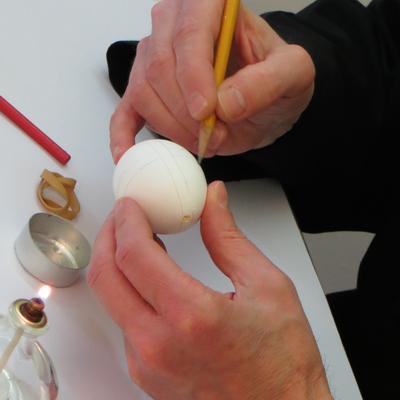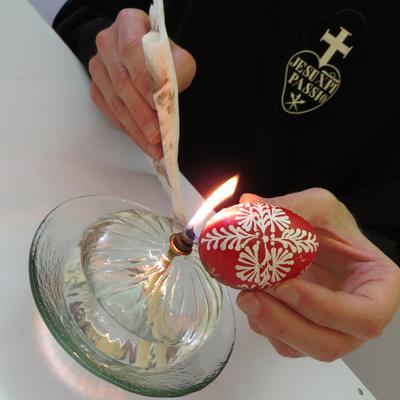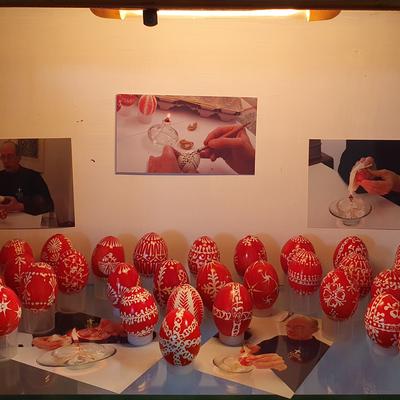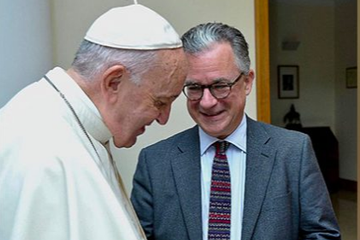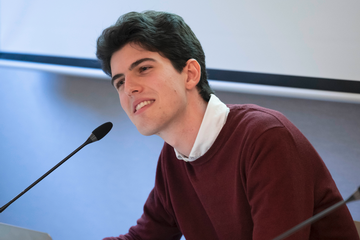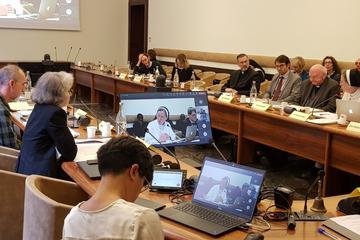
By Heather Walker
ROME — Passionist Father Lawrence Rywalt, CP, almost gave up hope that he could keep his annual Lenten tradition of making pysanky, the intricately designed and brightly coloured eggs typical for Easter in Eastern and Central European cultures. But good neighbours came to the rescue.
With the coronavirus lockdown that began in Rome in early March, he could no longer visit local vendors to find the white eggs he needed for this Easter tradition. Word of his conundrum got out in the neighbourhood and, respecting lockdown restrictions, neighbours left packages of white eggs at the monastery gate.
“Settling down to decorate eggs can seem frivolous, when people, medical people, are putting themselves on the line. People are dying, too, and here I am designing Easter eggs,” said Father Rywalt.
However, the pysanky tradition reminds him of a legend he once read, which says that “as long as someone decorates these eggs, the world will not come to an end because there will be a sign of life.”
Father Rywalt has integrated pysanky-making as a usual Lenten practice since 2001.
“It’s a form of meditation, as I am fully centred,” he said. “I listen to Gregorian chant or Eastern-rite music while I work mostly into the early hours (of the morning).”
The word “pysanka” is derived from the Ukrainian verb “to write.” Similar to writing an icon, decorative Easter eggs are written, Father Rywalt explained. The process begins with choosing a design and applying it by handwith drops of bees wax on a pin head onto the egg. (See the process in the photo gallery.) One egg takes about two hours to complete. No two eggs are the same, he noted, just as no two people are the same.
Father Rywalt remembers pysanky as part of the Easter traditions growing up in New York in his Italian-Polish family. As the end of Lent approached, his mother would prepare a basket of meats and dairy products, foods from which they had fasted during Lent. A priest would come to the home and bless the food basket, or they would take the basket to church for a blessing — an Easter tradition that continues for many Eastern and Central Europeans today. Pysanky also found a place in the basket. This memory stuck and, in 2001, Father Rywalt started exploring the art of pysanky, with the help of a Ukrainian lady, who taught him the traditional batik method, which employs hot wax and red ink.
Father Rywalt explained why pysanky are red. An old tradition says that Simon of Cyrene, a farmer, had gone into Jerusalem to sell his produce to those who were preparing the Passover feast that evening. Simon had eggs to sell, which the Jewish people would need for the Seder table. When the soldiers forced him to carry the cross of Jesus, Simon had no choice but to put down his egg basket. As he did so, the blood of Jesus fell on the basket. Later, when he returned for his basket, the eggs were no longer white, but bright red. Christians continue to colour eggs red to recall the redeeming blood of Christ, shed during his Passion, and to remember the first man to take up the cross of Jesus and follow him.
Father Rywalt has many pysanky displayed on a bookshelf in his study, including one from 2002, with colours and form still perfectly intact. He shared his collection of 50 pysanky with his religious community, both priests and sisters, during Lent this year.
“We were together as a community during this Lent and Holy Week, which we have never been due to ministry commitments,” he said. “Normally we disperse to parishes. It was a wonderful experience.”
He reflected on how the COVID-19 lockdown coincided with Lent and Easter.
“In the midst of all the darkness and death that surrounds us, there is something positive. We are celebrating the resurrection. Christ has overcome death. Death will not have the last word,” he said. “We need to stay with the creative, the inspirational. Otherwise, the darkness overcomes the light.”
Father Rywalt underlined that acts of kindness, such as an email, a Skype chat, a word of encouragement, and decorating eggs and giving them as gifts, can brighten the darkness.
The founder of the Passionists, St. Paul of the Cross, said the love of God is ingenious and always creative, explained Father Rywalt.
“So, the death and the resurrection is always new. It is never old because the Holy Spirit only does new things, never repetitive things,” he continued. “The death of any one of us makes our world poorer. Yet the new birth that comes about with new life — women who are giving birth during this period — these are loud statements that creation is going on. This is not the end of the process. We are living through the dying and rising.”
Father Rywalt said the future is unknown, but people must continue to have hope.
“We don’t know what is coming. We know something is coming, something new. Perhaps in a small way, visually, these Easter eggs are saying that something new is always happening, God’s love is always ingenious,” he said.
Father Rywalt has accompanied The Lay Centre community through the lockdown. During the Julian calendar Easter celebration at The Lay Centre April 19, he emphasized how the traditional Easter greeting, still common in the Christian east — Christ is Risen! Indeed, he is risen! — is very powerful, far more powerful than the commonplace “Happy Easter” greeting in the Christian west, as the former is an affirmation that comes from the people: “I believe this: Indeed, he is risen.”
Lay Centre Director Donna Orsuto saw Father Rywalt’s wonderful egg collection and offered to find a place for it at The Lay Centre, in a display cabinet near the third-floor chapel. Thanks to Father Rywalt, The Lay Centre will have a new annual tradition of a pysanky display. Who knows, perhaps a scholar will take up pysanky, as well, and perpetuate the art.
Photos by Father Lawrence Rywalt, CP
Born in New York City, Father Lawrence Rywalt, CP, entered the Passionist Congregation in 1990, professed Perpetual Vows as a Passionist in 1992 and was ordained a priest that same year. Father Rywalt has done parish and retreat ministry, as well as serving as assistant superior of the Passionist Monastery in New York City. In 2001, asked to move to the Passionist Generalate (international headquarters) in Rome, he took up the position of English language secretary to the Superior General and his Curia. Subsequently he was asked to assume the position of editor of the Passionist publication the “International Passionist Bulletin” and also to function as webmaster for the Congregation’s website http://www.passiochristi.org/. This year he will complete his term of office in Rome and return to his home province in the USA.
